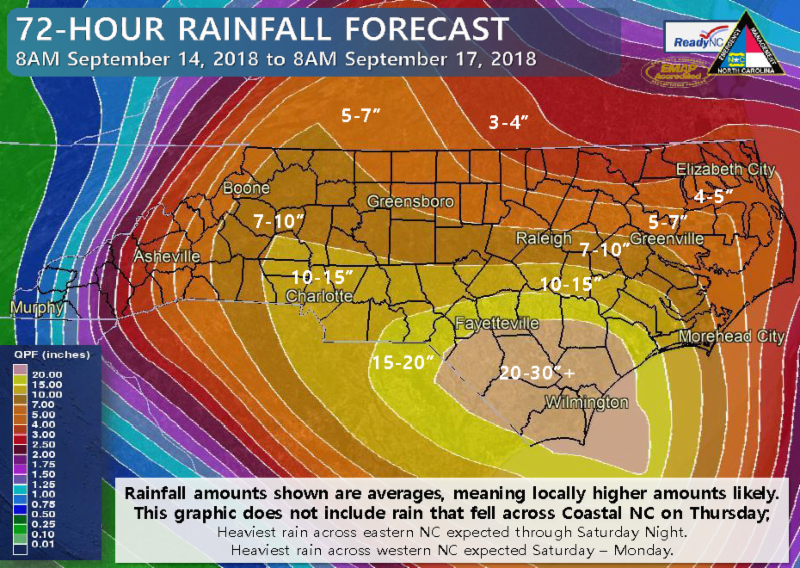Hurricane Florence Update From NCDA&CS (9/14/18)
go.ncsu.edu/readext?551831
en Español / em Português
El inglés es el idioma de control de esta página. En la medida en que haya algún conflicto entre la traducción al inglés y la traducción, el inglés prevalece.
Al hacer clic en el enlace de traducción se activa un servicio de traducción gratuito para convertir la página al español. Al igual que con cualquier traducción por Internet, la conversión no es sensible al contexto y puede que no traduzca el texto en su significado original. NC State Extension no garantiza la exactitud del texto traducido. Por favor, tenga en cuenta que algunas aplicaciones y/o servicios pueden no funcionar como se espera cuando se traducen.
Português
Inglês é o idioma de controle desta página. Na medida que haja algum conflito entre o texto original em Inglês e a tradução, o Inglês prevalece.
Ao clicar no link de tradução, um serviço gratuito de tradução será ativado para converter a página para o Português. Como em qualquer tradução pela internet, a conversão não é sensivel ao contexto e pode não ocorrer a tradução para o significado orginal. O serviço de Extensão da Carolina do Norte (NC State Extension) não garante a exatidão do texto traduzido. Por favor, observe que algumas funções ou serviços podem não funcionar como esperado após a tradução.
English
English is the controlling language of this page. To the extent there is any conflict between the English text and the translation, English controls.
Clicking on the translation link activates a free translation service to convert the page to Spanish. As with any Internet translation, the conversion is not context-sensitive and may not translate the text to its original meaning. NC State Extension does not guarantee the accuracy of the translated text. Please note that some applications and/or services may not function as expected when translated.
Collapse ▲This newsletter contains important information from the North Carolina Department of Agriculture and Consumer Services Veterinary Division in regards to Hurricane Florence. Please share this newsletter with others as appropriate. To subscribe to this newsletter, please send an email to the Veterinary Division’s general email account, Joe.Web@ncagr.gov.
Emergency Management Weather Tracking
The storm has stalled sooner than anticipated and may take longer to traverse the state increasing the chances of more rain.
Tornadoes have been spotted throughout the night in various areas of eastern North Carolina. The threat of flooding and wind damage remain very real. Power may be out in areas for days or longer, depending on how long the storm takes to move out of areas.
In all situations, err on the side of your safety. Don’t traverse water of unknown height or moving water in the road. Stay tuned-in to your local forecasts and heed official warnings and recommendations for your safety.
Click here for the full report.
Hurricane Florence Update Equine Evacuations
Due to the change in path of Hurricane Florence, the Hunt Horse Complex at the State Fairgrounds in Raleigh is opening as an equine evacuation site until safe for evacuated horses to be returned to their farms or September 24, 2018, when it’s closed to prepare for the N.C. State Fair Horse Shows.
The complex will be accepting reservations for horses by telephone. Stalls may be reserved by calling the Hunt Horse Complex Public Safety team at 919-612-6767.
PLEASE call ahead to determine space availability before arriving. The Hunt Horse Complex will be offering housing ONLY. Owners will need to bring all provisions for their animals.
Reduced pricing structure per stall: 1 day – $17, 2 days – $20, 3 days – $23, 4 days – $26, 5 days – $29, and $3 per additional day per stall thereafter. See the Facility Use Agreement/Liability Waiver Form that is required for each owner.
Please enter the Hunt Horse Complex off Youth Center Drive to expedite stalling.
The Sen. Bob Martin Ag Center in Williamston is open as an equine evacuation site until 5 p.m. The cost is $10 per horse and $5.50 per bag of shavings with a minimum of two bags.
Call 252-792-5802 for more information. Check-in is at barns E and F and you must have proof of negative Coggins.
- Florida Florida Suspension of Interstate Movement Requirements
- Georgia Georgia Temporary Suspension
- North Carolina NC Waives ICVI Requirements for Hurricane Florence
- South Carolina SC Suspension of Interstate Movement Requirements
- Tennessee Tennessee Suspension of ICVI’s
- Virginia VA Waiver of Certain Animal Import Requirements
- Download a PDF of the map:
Regional Map of Livestock Veterinarians and Animal Health Technicians




